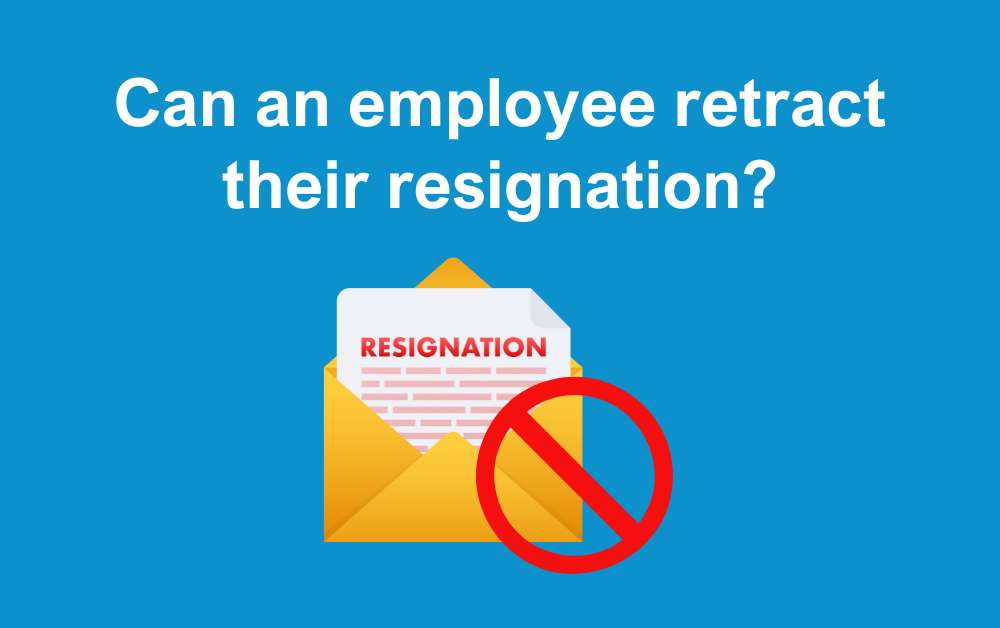Retracting resignation: The decision to resign from a job holds significant weight. It’s a choice often made after careful contemplation and reflection. But what happens when an employee has second thoughts about this pivotal decision? Can an employee retract their resignation once it’s been tendered?
In this blog post, we will aim to provide you with insights into this scenario, exploring the factors you should consider and the options available within the legal framework.
Watch our video: “Understanding Employee Departures”
Watch our video: “Making a Counter Offer and Retracted Resignations”
Understanding Employee Resignations
Resignations are formal processes initiated by employees when they intend to leave their positions. Once an employee submits a written resignation letter , it sets in motion a series of administrative and managerial procedures. However, it’s important to recognise that a resignation isn’t always set in stone, and employees might approach you with the intention to retract their resignation. However, can an employee retract their resignation?
The Possibility of Retracting a Resignation
In the UK, there’s no absolute legal right for employees to retract their resignations. Whether or not an employee can retract their resignation largely depends on several factors, including:
- Timing: The timing of the retraction request matters. If an employee indicates a wish to go through a withdrawal of their resignation soon after submitting it, it might be easier to accommodate.
- Reasons for Retraction: Employees who provide valid reasons for wanting to stay might have a stronger case for retraction. A change in personal circumstance, personal reasons, changes in future plans, or job market shifts could contribute to their decision.
- Employer’s Discretion: Ultimately, the decision to accept a retraction lies with you as the employer. You’ll need to assess factors such as the company’s needs, the employee’s performance, and the potential impact on team dynamics.
- Contractual Agreements: Review the employee’s employment contract and any relevant policies to see if they include provisions about resignations and retractions. Some contracts might outline specific guidelines for such situations.
Resigning in the heat of the moment
Emotions can sometimes run high in the workplace, and in the heat of the moment, impulsive decisions can be made. One such decision might be the resignation of an employee. But what happens when cooler heads prevail, and the individual realises that their resignation was a hasty move?
If your employee quits in this way, we encourage you to request the resignation in a written formal letter. This also gives the employee the opportunity to think about their decision. This may be in your employee contract already which means they are required to provide a resignation in writing anyway.
Although there is no legal requirement for you to accept the retraction, if they resigned in the heat of the moment and you decide not to accept the retraction, you may not be successful if this goes to tribunal in the future. It may be judged that the employer accepted the resignation too quickly and didn’t give the employee time to reflect on what happened.
Steps to Handle a Resignation Retraction
- Open Dialogue: When an employee approaches you with a retraction request, engage in an open and respectful conversation to understand their reasons and motivations.
- Assess the Situation: Consider the potential impact of the retraction on the team, the employee’s performance history, and the company’s needs. Keep in mind there may be an element of risk if you decide to reject the retraction.
- Consult HR or get legal advice: If you’re unsure about how to proceed, consult with a HR consultant or employment law expert. We can help you with any questions you have and can provide guidance based on the specific circumstances.
- Negotiation: If you’re open to the retraction, discuss potential solutions that could accommodate the employee’s needs while aligning with the company’s goals.
Why You Shouldn’t Accept a Retracted Resignation
On the other hand, what should you do if an employee retracts their resignation after you’ve already started the process of finding a replacement? While it might be tempting to welcome them back with open arms, it’s important to keep in mind the impact this could have. Therefore, consider the impact this can have on the company’s culture, as well as the potential risks involved.
Accepting a retracted resignation can create resentment among other team members.
If the employee was already planning on leaving, other team members might have started to mentally prepare for their departure. They may also have started to adjust to the idea of working without them. If they suddenly come back, it can disrupt the team’s dynamics, employment relationship and create confusion and frustration.
Retracting their resignation due to second thoughts
It’s important to remember that if an employee is retracting their resignation due to second thoughts about their new employer, the reasons for leaving your company are still there. While it’s natural to feel flattered that the employee wants to stay, it’s important to take a step back and consider the long-term implications. If the employee was unhappy enough to resign in the first place, it’s likely that there were deeper issues at play. If these underlying issues are not addressed, the employee may eventually become dissatisfied again. They may even resign for good, leaving you back at square one.
Negative impact on the company’s culture
Secondly, accepting a retracted resignation based on second thoughts as a new employer can have a negative impact on the company’s culture . Other employees may start to feel like they don’t have a clear understanding of what is expected of them or what the company stands for. It may also create a sense of instability, which can lead to employees feeling less secure in their roles. This can be especially true if the retracted resignation is due to external factors, such as a more attractive job offer, rather than internal reasons.
Retracted resignation can be costly
Lastly, accepting a retracted resignation can be costly in terms of time and resources. If the employer has already started the process of finding a replacement, it can be frustrating and demoralising to have to start the recruitment process all over again. This can lead to lost productivity, decreased morale, and even increased turnover if other employees start to feel like the company is not stable.
Conclusion
While it’s tempting to accept a retracted resignation, it’s important to consider the long-term implications for the company and its culture. If the employee is retracting their resignation based on second thoughts at a new employer, it’s important to address the underlying issues that led to their resignation in the first place. This may involve having difficult conversations about job satisfaction, work-life balance, or career development. Ultimately, the goal should be to create a positive and engaged workforce that is committed to the company’s success, rather than relying on short-term fixes. If you would like any advice on ‘can an employee retract their resignation’, contact us now.







